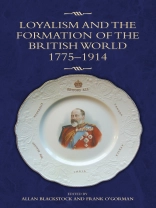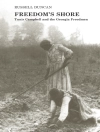Explores loyalism as a social and political force in eighteenth and nineteenth century British colonies and former colonies.
Loyalism in Britain and Ireland, which was once seen as a crude reaction against radicalism or nationalism, stimulated by the elite and blindly followed by plebeians, has recently been shown by historians to have been, on the contrary, a politically multi-faceted, socially enabling phenomenon which did much to shape identity in the British Isles. This book takes further this revised picture by considering loyalism in the wider British World. It considersthe overall nature of loyalism, exploring its development in England, Ireland and Scotland, and goes on to examine its manifestation in a range of British colonies and former colonies, including the United States, Canada, India, Australia and New Zealand. It shows that whilst eighteenth-century Anglo-centric loyalism had a core of common ideological assumptions, associational structures and ritual behaviour, loyalism manifested itself differently in different territories. This divergence is explored through a discussion of the role of loyal associations and military institutions, loyalism’s cultural and ritual dimensions and its key role in the formation of political identities. Chronologically, the book covers a pivotal period, comprehending the American and French Revolutions, the 1798 Irish rebellion and Irish Union, the Canadian rebellions of 1837, and Fenianism and Home Rule campaigns throughout the British World.
Allan Blackstock is Reader in History at the University of Ulster and author of
Loyalism in Ireland, 1789-1829 (Boydell, 2007).
Frank O’Gorman was Professor of History at the Universityof Manchester.
Contributors: Allan Blackstock, Richard P. Davis, Oliver Godsmark, William Gould, Jacqueline Hill, Andrew R. Holmes, Kyle Hughes, Mark G. Mc Gowan, Donald M. Mac Raild, Keith Mason, Patrick Maume, Katrina Navickas, Frank O’Gorman, Brad Patterson, Scott W. See
Inhoudsopgave
Loyalism and the British World:overviews, themes and linkages – Allan Blackstock and Frank O’Gorman
Origins and Trajectories of Loyalism in England, 1580 – 1840 – Frank O’Gorman
The ‘Spirit of Loyalty’: Material Culture, Space and the Construction of an English Loyalist Memory, 1790 – 1840 – Katrina Navickas
Anti-Catholicism and Orange Loyalism in Nineteenth-Century Britain – Donald Mac Raild and Kyle Hughes
Loyalty and the Monarchy in Ireland, c.1660 – c.1840 – Jacqueline Hill
The Trajectories of Loyalty and Loyalism in Ireland, 1793 – 1849 – Allan Blackstock
Presbyterians, Loyalty and Orangeism in Nineteenth-Century Ulster – Andrew Holmes
Unionists and Patriots: James Whiteside, the Irish Bar and the dilemmas of the Protestant Nation in Victorian Ireland – Patrick Maume
Loyalism in British North America in the Age of Revolution, c.1775 – 1812 – Keith Mason
‘A colonial hybrid’: Nineteenth-Century Loyalism as articulated by the Orange Order in the Maritime Colonies of British North America – Scott W. See
Canadian Catholics, Loyalty and the British Empire, 1763 – c.1901 – Mark G. Mc Gowan
Loyalism in Australasia, 1788 – 1868 – Richard P. Davis
‘We love one country, one queen, one flag’: Loyalism in Early Colonial New Zealand, 1840 – 1880 – Brad Patterson
Clientelism, Community and Collaboration: Loyalism in Nineteenth-Century Colonial India – William Gould
Clientelism, Community and Collaboration: Loyalism in Nineteenth-Century Colonial India – Oliver Godsmark












